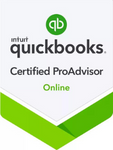How Outsourced Bookkeeping Can Reduce Overheads And Boost Profitability
Tackling in-house bookkeeping can feel like a relentless task. The constant struggle to track every dollar in and out not only consumes time but often results in potential errors that could impact your financial health. Compliance with ever-evolving tax regulations becomes a daunting challenge, and the nuances of meticulous number-crunching can quickly overwhelm.

Outsourcing accounting services steps in as a practical remedy. The burdensome task of staying abreast of tax regulations? That’s taken care of by experts who make compliance their business. No more sweating the details of number-crunching or worrying about the dynamic shifts in the financial landscape—outsourcing covers it all.
Beyond the relief from challenges, outsourcing offers concrete benefits. Time, the most precious resource, is freed up for you to concentrate on core business operations. The risk of errors is minimized as professionals handle your financial records with top-tier precision. Financial transparency becomes a reality, providing you with a clear overview of your business’s fiscal health.
Picture this: rather than being immersed in the complexities of bookkeeping, you’re strategically steering your business towards growth. Outsourcing isn’t just a solution; it’s a pivotal move that positions your business for success. It’s about more than just avoiding pitfalls—it’s a straightforward, efficient way to elevate your business to new heights.
Why Outsource Bookkeeping?
Ever wonder why businesses are outsourcing their bookkeeping? Well, it’s not just a trend—it’s a smart move with some clear benefits to outsourced bookkeeping.
First off, you get expertise on your side. When you outsource, you’re tapping into the skills of professionals who know the ins and outs of bookkeeping like the back of their hand. No need to stress about keeping up with complicated tax rules or getting lost in the numbers game.
Accuracy is another big win. Let’s face it, errors in your financial records can be a real headache. Outsourcing minimizes the risk of mistakes, ensuring your books are in order. This isn’t just about avoiding blunders; it’s about having reliable, precise numbers at your fingertips.
Now, think about your time. Managing bookkeeping in-house can gobble up precious hours. When you outsource, you free up that time to focus on what really matters—your core business activities. It’s like having a weight lifted off your shoulders.
The List Of Savings
Take a close look at how you’re handling bookkeeping in your business. This checklist will help you figure out what you’re spending on in-house bookkeeping and shows you where you could save big by outsourcing. It’s not just about spending less; it’s about using your resources smartly.
Outsourcing can free up money and time, letting you focus on what really counts—your main business activities.
Let’s break down the key areas where making a change could mean more savings and more power for your business.
Salary And Benefits For In-House Staff
- Current Situation: Managing an in-house bookkeeping team comes with a hefty price tag—salaries and benefits add up fast.
- Outsourcing Solution: Say goodbye to the need for full-time in-house staff. Outsourcing slashes payroll and benefits costs significantly, putting more money back into your business.
Training And Development Costs
- Current Situation: Keeping your in-house team up-to-date with ever-changing financial rules means ongoing training costs.
- Outsourcing Solution: Outsourced services bring in experts who are already on top of the latest regulations. This means you cut back on constant training expenses, letting you allocate those funds elsewhere.
Software And Technology
- Current Situation: Investing in bookkeeping software and updates can strain your budget.
- Outsourcing Solution: No more worrying about software expenses. Let the outsourcing experts handle the tools, saving you from the costs of buying and updating software.
Office Space And Supplies
- Current Situation: Having a dedicated space for in-house bookkeeping means spending on office space and supplies.
- Outsourcing Solution: Cut down on expenses tied to office space and supplies. Outsourcing means you don’t need a dedicated bookkeeping area, saving you both space and money.
Compliance And Audit Costs
- Current Situation: Managing things in-house might expose you to risks and potential audits, leading to hefty compliance costs.
- Outsourcing Solution: Minimize risks and their associated costs by relying on experts. Outsourced specialists are well-versed in compliance, reducing the chances of audits and saving you money in the long run.
Opportunity Costs
- Current Situation: In-house bookkeeping eats up a significant amount of your time, taking focus away from core business activities.
- Outsourcing Solution: Free up that time! Outsourcing lets you redirect your focus back to what really matters—your core business operations. This switch has the potential to boost your overall productivity and profitability.

How To Outsource Bookkeeping?
Outsourcing your bookkeeping can change things for your business, but finding the right service requires careful consideration.
Here’s a step-by-step guide to help you make the best choice aligned with your business needs and goals:
Step 1: Define Your Requirements
Clearly outline your bookkeeping needs. Identify specific tasks, frequency, and the level of expertise required. A bookkeeping clean up will also be helpful when it comes to determining your requirements. This forms the foundation for your search.
Step 2: Research Potential Service Providers
Look for reputable outsourced bookkeeping services. Use online platforms, referrals, or industry associations to compile a list of potential candidates.
Step 3: Assess Experience And Expertise
Evaluate the experience and expertise of each service provider. Consider their track record, client testimonials, and the industries they specialize in. Ensure they understand your specific business requirements.
Step 4: Check Credentials And Certifications
Verify the credentials and certifications of the professional bookkeeping services. Qualified professionals with relevant certifications ensure a higher standard of service.
Step 5: Explore Technology And Security Measures
Inquire about the technology and security measures in place. Ensure the service provider uses reliable bookkeeping software and employs robust security protocols to safeguard your financial data.
Step 6: Discuss Communication Channels
Communication is key. Clarify how the outsourced service keeps you informed about your financial status. Establish the frequency and methods of communication to ensure transparency and responsiveness.
Step 7: Understand Pricing Models
Clearly understand the pricing models offered by each service provider. Look for transparency in pricing, and ensure that there are no hidden costs. Choose a model that aligns with your budget.
Step 8: Assess Scalability
Consider your business growth. Choose a service provider that can scale their services according to your evolving needs. Scalability ensures a long-term partnership that adapts to your changing business dynamics.
Step 9: Review Service Level Agreements (SLAs)
Carefully review the SLAs provided by each outsourced bookkeeping service. Ensure they align with your expectations regarding service delivery, performance metrics, and response times.
Step 10: Seek Client References
Request client references from the potential service providers. Contact existing or past clients to gain insights into their experiences, reliability, and the quality of service provided.
Step 11: Conduct A Trial Period
If possible, consider a trial period before committing to a long-term contract. This allows you to assess the actual performance and compatibility of the outsourced bookkeeping service with your business.
Step 12: Finalize Terms And Sign Agreement
Once satisfied with all aspects, finalize the terms of engagement and sign a detailed agreement. Clearly outline roles, responsibilities, deliverables, and expectations to ensure a smooth partnership.
When To Outsource Bookkeeping?
Outsourcing bookkeeping can be a strategic move for businesses, especially when specific indicators arise.
Here are scenarios suggesting it might be time to consider outsourcing your bookkeeping:
Overwhelmed By Administrative Tasks:
If your team is drowning in administrative tasks and struggling to keep up with bookkeeping responsibilities, outsourcing can bring relief, allowing your in-house staff to focus on core business functions.
Lack Of In-House Expertise:
When financial complexities surpass your team’s expertise, outsourcing ensures access to skilled professionals with specialized knowledge, reducing the risk of errors and compliance issues.
Inconsistent Financial Reporting:
If you’re experiencing irregularities or delays in financial reporting, outsourcing provides consistent, timely, and accurate reporting, enhancing your decision-making processes.
Difficulty Managing Growth:
As your business expands, bookkeeping demands increase. Outsourcing accommodates scalability, supporting your growth without overwhelming your internal resources.
Concerns About Compliance:
If you find compliance issues keeping you up at night, outsourcing to experts ensures adherence to regulations, minimizing the risk of penalties and audits.
Struggling With Technology:
If keeping up with the latest bookkeeping software and technology is a challenge, outsourcing ensures you benefit from cutting-edge tools without the burden of managing them in-house.
Cost-Effective Solutions:
If the costs associated with hiring and training in-house staff, purchasing software, and maintaining office space are straining your budget, outsourcing offers a cost-effective alternative.
Time-Consuming DIY Bookkeeping:
If you find yourself spending excessive time on bookkeeping tasks, outsourcing liberates your time for strategic business planning and growth initiatives.
Learn More About Rakow & Co.'s Bookkeeping Services
Ready to experience the benefits of outsourced bookkeeping? Explore how Rakow & Co. can streamline your financial management. Visit our website or contact us today to learn more about our tailored solutions for your business.
FAQs
Still looking to find out more about outsourcing your bookkeeping? The questions below may be able to help you make a final decision.
Why should I consider outsourcing my bookkeeping?
Outsourcing taps into financial experts, ensuring accuracy, compliance, and freeing up time and resources for core business activities.
How can outsourced bookkeeping help my small business?
Outsourced bookkeeping provides access to skilled professionals without the need for a full-time, in-house team. This ensures accurate financial records, facilitates efficient scaling, and allows redirection of time to strategic planning and business development.
What cost savings can I expect by outsourcing bookkeeping?
Outsourcing brings significant cost savings by eliminating the need for full-time, in-house staff. It also avoids costs related to training, software updates, office space, and potential compliance-related expenses, allowing for more strategic resource allocation.
How do I choose the right outsourced bookkeeping service?
Define your needs, research providers, assess experience, verify credentials, and explore technology and security measures. Ensure pricing aligns with your budget, discuss communication channels, review service level agreements, and consider a trial period.
Can outsourced bookkeeping adapt to My business’s changing needs?
Yes, outsourced bookkeeping is scalable. Reputable providers understand business evolution, offering flexibility for growth or fluctuations. This ensures a long-term solution tailored to your changing requirements
More Articles For You

Making The Most Of Tax Savings Through Proper Bookkeeping In NJ
Running a business in New Jersey (NJ) presents a unique blend of opportunities and challenges. NJ’s strategic position, broad economy, and lively market attract business

The Importance Of Accurate Bookkeeping For Ecommerce
Running an ecommerce business can be incredibly rewarding, but it also comes with its own set of unique challenges. With hundreds or even thousands of

Outsourcing Accounting Services For Ecommerce Business Optimization
Are you an ecommerce entrepreneur looking to streamline your operations and drive growth? One area that often gets overlooked but can have a significant impact





